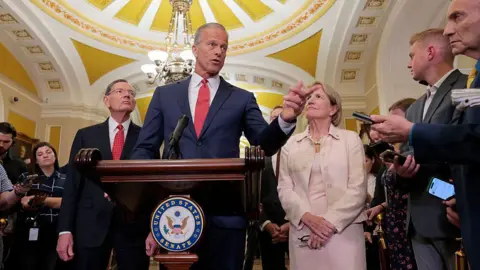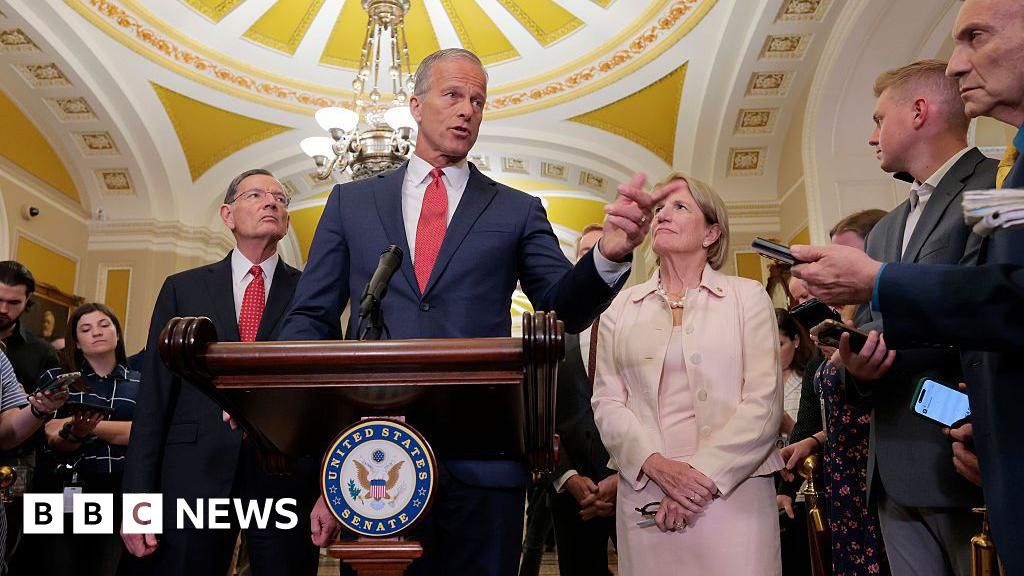BBC News
 Getty Images
Getty ImagesThe US Senate is holding a marathon vote on a sprawling budget bill that is critical to President Donald Trump’s agenda.
The One Big Beautiful Bill Act, though, hangs in the balance as Trump’s Republicans – who control both chambers of Congress – remain split over how much to cut welfare programmes by as they seek to extend tax breaks.
If approved in the Senate, the bill will return to the lower House of Representatives, which passed its own version by a single vote last month.
Elon Musk has stepped up his criticism of Republicans who “campaigned on reducing government spending” and then “immediately voted for the biggest debt increase in history”.
The tech billionaire was in charge of Doge, the Department of Government Efficiency, which has been tasked to find ways of cutting government spending, until the pair fell out.
The US national debt currently sits at $36tn (£26tn), according to the treasury department. According to new estimates, if passed, the bill will add $3.3tn to that debt.
The proposed legislation – running to nearly 1,000-pages – includes increased spending for border security, defence and energy production – offset to a degree by cuts to healthcare and food-support programmes.
Proposed cuts could strip nearly 12 million Americans of their health insurance coverage, according to the Congressional Budget Office, a non-partisan federal agency.
Senators are currently arguing for or against adding amendments – each voted on separately in a process called “vote-a-rama”, which could entail up to 20 hours of debate.
The Republican debate has focused on how much to cut welfare programmes in order to extend $3.8tn (£2.8tn) in Trump tax breaks.
One of their amendments, by Senator John Cornyn, proposed reducing federal Medicaid payments – the programme that helps low-income groups cover healthcare costs – to states that provide coverage to undocumented immigrants charged with specific crimes. It was not approved.
Democrats have criticised the proposed cuts.
Senator Ed Markey, for instance, proposed an amendment to delete provisions which he argued would force rural hospitals to limit their services or shut down altogether.
Other amendments proposed by Democrats concerned the bill’s cuts to food assistance. They were all voted down along party lines.
On Sunday, Democrats used a political manoeuvre to stall the bill’s progress, calling on Senate clerks to read all 940 pages of the bill aloud, a process that took 16 hours.
It followed weeks of public discussion and the Senate narrowly moving on the budget bill in a 51-49 vote over the weekend.
Two Republicans sided with Democrats in voting against opening debate, arguing for further changes to the legislation.
One of those Republicans, North Carolina Senator Thom Tillis, announced his retirement following that vote and said the legislation broke promises that Trump and Republicans made to voters.
“Too many elected officials are motivated by pure raw politics who really don’t give a damn about the people they promised to represent on the campaign trail,” Tillis wrote in his announcement.
Kentucky Republican Senator Rand Paul objected to the debt increase, and cuts to Medicaid.
Republicans in the Senate can only afford three defections in order for the bill to pass.
If they lose three votes, Vice-President JD Vance will have to cast a tie-breaking vote.
The bill would then return to the House of Representatives, where a full vote on the Senate’s version could come as early as Wednesday morning.
Fiscal hawks of the Republican-led House Freedom Caucus have threatened to torpedo the Senate package which they say adds over $650bn to the national deficit.
Despite the uncertainty, White House Press Secretary Karoline Leavitt has said Trump is “confident” the bill will be on his desk for a final signature by 4 July.
For his part, Elon Musk has, once again, threatened to set up a new political party if the bill clears Congress.
In a sign of further alienation between the pair, Trump has suggested that Doge should take a look at cutting the subsidies that Tesla CEO’s companies have received.
“Elon may get more subsidy than any human being in history, by far, and without subsidies, Elon would probably have to close up shop and head back home to South Africa,” Trump wrote on his Truth Social platform.
(With additional reporting from Bernd Debusmann Jr at the White House)


